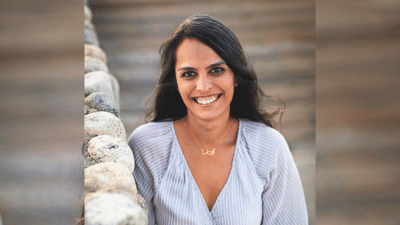 By Uttama Kirit Patel
By Uttama Kirit Patel
Because of a boy, I wanted a girl. The scene is commonplace: I am being driven in an Ambassador on Marine Drive, the car stops at a traffic light, and a young boy tries to sell me coloured pens. He appears to be the same age as me, six years old, and I remember my thought: ‘that could have been me’. Born to Indian parents who lived in Abu Dhabi, I was all-too-aware of my good fortune. Guilt arrived, the first of many visits. A decade later, I decided I would find that girl, the one who could have been me had she been born into a different family, and I would adopt her.
It reeked of romanticism, that desire. And what a woman desires, particularly in the context of procreation, has largely been deemed irrelevant. To my forsaken foetus (female), I wrote as the start of an apology letter to the biological child I did not want to have. The maternal ache other women spoke of, a longing from the epicentre of their being, I had never felt that. Even though I wanted to be a mother, my way of becoming one defied the presumption that women yearn to birth babies. I registered for adoption and did what adoptive parents do: wait.
Four years later, still waiting, I opened myself to the idea of having biological children in the way my husband had embraced adoption after meeting me. Faced with my individual motivation for getting pregnant, I fell short. That visceral longing remained absent. But by then, wearier and whiter-haired, I knew my lack of desire did not mean a lack of capacity. We mutually agreed we would not bring into my uterus or our home any child unless we were certain we could give what the lifelong respect of another human being demands. Of that, no doubt existed. How the baby was formed had no bearing on how loved she would be.
Then I found myself pregnant for the first time, nodding along as a gynaecologist told my husband that the foetus inside me may or may not survive. Guilt appeared, as expected, and tested my intentions: How badly do you want this? After a dizzying series of acronyms, IUI, IVF , WTF , I wondered if that judgmental language of fertility had been penned just for me: inhospitable womb, nonviable embryos, hostile uterus. Did my unconventional choices make me culpable?
The odds thought so. I miscarried a fairytale number of times: three. The first ended in an emergency surgery, my life at risk from internal bleeding. Without question, I wanted to survive. My daughter, the one we were two years away from being matched with, was waiting. When the post-op report used the words ‘selective abortion’, I let my heart break. The miscarried foetus did not pass through me naturally, and so by default, I was incriminated.
By the time we lost the third, what became clear was the dissonance between my own feelings and those projected onto me. People pitied and comforted me, wrongly assuming I was sad because I would not have biological children. About that, I could not have cared less. What I mourned was what I had felt for the first time: a tangible, physical presence inside my body. A knowing, before any blood test confirmed, of the moment that presence arrived and then left. In that passing, parts of me evacuated too; not figuratively but materially, the tissue, the cells, the blood, my own composition contained within them. I grieved the relationships only I had borne.
The commercialisation of reproduction belittled my losses. How quickly others wanted me to recover. I was regaled with tales of women who’d miscarried in double digits. And had I heard of that art piece fashioned from hundreds of IVF needles? Most haunting of all was the number of parents who said, “You’re lucky you lost them early.” I wondered how they’d react if I consoled the loss of their toddler by saying, “At least he wasn’t a teenager.”
Abandoning any soft, feathery notions of motherhood, I faced my ugliness. There is cruelty in maternal angst, as is there is envy, empathy and surrender. Guilt returned, suggesting that my reluctant womb failed to provide a safe enough home. That accusation exposed the imbalance in how my desires are weighted. In the political, familial and societal realm, a woman’s choices are restricted. And yet, when life does not go as planned, each of her decisions, whether she exercised too often or not at all, ate the right vegetables, worked too much, took the folic acid, or wanted the child too little, is suddenly viewed as all-powerful. Potent enough, it seems, to birth or end a life.
No, thank you. I bid guilt goodbye and forgave myself. Not for the choices I’d made but for succumbing to the narrow, patriarchal narrative that made me question them at all. Mothering is nuanced, paradoxical, and boundless. It need not be on the defence, though it often takes that position. When all women are assumed to be aspiring mothers, we have to either comply or refuse. When we’re told we should be a particular type of mother, off we go; we’re either gentle or authoritarian, sleep train or cuddle, adopt or birth.
Parenthood is beyond polarities. Losing biological children did not make me want my adopted daughter more. I have always wanted that girl so damn much. Now that she is home, the romantic in me wants to call it an inevitability. But I no longer downplay how much it takes for a woman to satisfy a singular desire.
 By Uttama Kirit Patel
By Uttama Kirit Patel